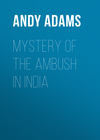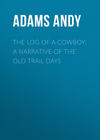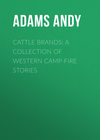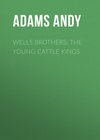Kitabı oku: «Mystery of the Ambush in India», sayfa 4
VII
The Temple of Kali
As the boys stood rooted, the strange cries came again; first from one direction, then the other. But now there was a change in their weird tones. They trailed longer, as though the thugs were telling each other something, perhaps that they had helpless victims caught between.
Both Kamuka and Chandra sensed it. Kamuka was for taking to the jungle, a setting that he knew so well, even though it meant facing creatures different from those in Brazil. Chandra was willing to go along with that, but Biff overruled them with a single vote.
“They’d start beating the brush for us,” he argued, “and that would only drive us deeper. It’s not going into the jungle that I mind; it’s our chance of ever coming out.”
He was beckoning the other boys along the road as he added: “We must keep ahead of that bunch behind us, because they are really hot on our trail. Those up front are farther away, even though they are coming toward us. We may still have time to find a clearing where we can hide, or better still, some jungle path.”
Tensely, the boys quickened their pace. The road here was winding more sharply, for it was veering in among the low-lying hills. As they passed a turn in the road, Biff pointed ahead to a gap in the thick jungle, exclaiming, “That may be it!”
Again, long trailing cries came from both directions as though taunting Biff’s hopes. The call from in back was still as far behind, but the one ahead was much closer. Gritting his teeth, Biff muttered for his own benefit, “This will have to be a path – or else!”
It was a path, but a rocky one, leading up a steep slope that flanked the road. But the boys took to it eagerly, climbing rapidly despite their packs, so as to reach the first spot where the path itself made a sharp turn amid the thick foliage.
Once there, they were out of sight from the road below, so they paused for a breather while they dipped water from a little stream that tumbled down among the rocks beside the zigzag path.
Biff asked Chandra, “Any idea where this path may take us?”
“Maybe nowhere,” responded Chandra glumly. “It may just be an old stream gone dry.”
“I don’t think so.” Kamuka studied the course of the stream with a practiced eye. “Look at the smooth rocks here in the stream, yet all those on the path are rough. If water came up there a lot, they would be smooth, too.”
Chandra still was doubtful until Kamuka pointed far up the path.
“See where the path takes a short cut over the little hump of ground?” he said. “The stream would go around that, even in the wet season. This is a path, all right.”
“And we’d better be using it,” Biff put in, “before those thugs get the same idea.”
Low calls of “Hyyaahh” from both directions down on the road below indicated that the pursuing groups were close together, probably closing what they thought were the jaws of a trap. Now that they had regained their wind, the boys lost no time in resuming their climb, this time at a steady, even speed that they were sure would keep them well ahead.
Kamuka was correct about the path. It was a real one, for soon it veered away from the stream entirely and brought the boys to a jutting promontory that gave them a good view over the green wave of the jungle slope below. There they rested again, while Biff traced the course of the road that they had left.
“If we could only cut across and strike the road a few miles up the line,” he said, “we would really shake off those thugs. But no such luck, I guess. We’d never hack our way through all that growth. Let’s stick to the path.”
Sticking to the path meant further climbing, but it proved short, as the top of the hill was only a little way above. As they reached the final hump and emerged from the thick foliage, the boys stopped in surprise. Perched on the summit was a ruined temple, its white marble steps showing through the tangled underbrush, which was climbing up the battered pillars and weather-worn walls.
A corner of the tiled roof had fallen in and a tree projected there instead of a small dome, one of a group surrounding a larger central dome, which was also in a battered state. As the boys reached the steps, there was a sudden chatter from within the ruined temple, and troupes of monkeys scampered out through the holes in the roof and the long window slits in the walls.
“A good hiding place,” decided Chandra, “if the monkeys have been using it as their home.”
“Then we can lie low here,” Biff said, “until after the thugs have gone.”
They were entering through a fancifully tiled archway as Biff spoke. Chandra extended a restraining hand as Biff turned toward an inner corner, where a battered stone railing marked a stairway leading to a floor below.
“Be careful where you lie low,” warned Chandra. “These old places are alive with deadly cobras.”
“But how can the monkeys live with the snakes?”
“They don’t. Monkeys stay up there” – Chandra pointed to a balcony where tiny faces and quick little eyes were peering through what was left of a once ornamental railing – “and the cobras live in the pits below.”
Biff saw that the stairway was blocked by broken chunks from the floor, but he eased away on the chance that a poisonous snake might be lurking in the rubble. Kamuka, meanwhile, had crossed the floor to a small domed platform that was reached by steps leading up from three sides. Kamuka called:
“Biff,” he called. “Come look! See who is here!”
Biff joined Kamuka and stared up at the most hideous idol he had ever seen. It was carved from a dark wood and had white, glaring eyes formed of tiny pearls with a jet-black stone in the center. Larger pearls formed the teeth of an open mouth, from which a carved, red-painted tongue extended.
The ferocious image had four arms extended from its body. One hand held an actual knife with jeweled handle and long curved blade, as though ready for a downward stroke. Another hand was raised in a warning gesture. The third dangled a carved human head. The fourth hand was thrust slightly forward and was cupped, but empty.
From the idol’s neck hung a chain of human skulls, forming a huge, grotesque necklace. Biff had already guessed the identity of the carved horror, when Chandra arrived and gasped the name: “Kali!”
Biff stared at Chandra, wondering why he was so shaken. In a frightened tone, Chandra exclaimed:
“This temple is old and broken, but the idol is a new one! We can’t hide here! This is where the thugs themselves meet to worship Kali. They have driven us up into their trap, and they will come here to hunt us down. See that hand, Biff, the one like a cup? It is supposed to hold blood, so it is waiting for the big ruby that you carry!”
An odd fascination had gripped Biff as he studied the hideous figure of Kali. He snapped out of it now.
“What are we waiting for?” he demanded. “Let’s get out of here!”
They couldn’t go out the way they had come in. Already, a long-drawn cry was sounding from the path leading up to the temple. It was answered almost from the doorway, and the boys realized now that other members of the Kali cult must have been lurking in the fringes of the jungle, watching their arrival.
Kamuka, quick as ever, pointed out a corner stairway leading up to a stone balcony in the rear wall, just above the Kali statue. Sunlight shone through a slitted window that was located there. Grabbing their belongings, the boys raced up the steps, then along the balcony, where they jumped its broken gaps. They reached the window slit and squeezed themselves through to a narrow outer ledge, where they pressed their backs against the wall and stared downward hopelessly.
They were high up in the temple now, the equivalent of about three floors in an ordinary building. There, a full thirty feet below, was a stone court at the rear of the temple wall. The paving was cracked, but as hard as ever – anything but a happy landing.
Close to the wall was the circular rim of a stone well, but it was built up only a few feet from the courtyard. Not a slit, not an opening showed in the wall itself, as the boys studied it cautiously, except for a few irregular cracks that would afford no hold whatever.
If they had arrived here sooner, they could have planned some way to lower themselves to the courtyard, but that was too late for Biff and his companions now.
Already, high-pitched cries of glee were sounding from within the very walls of the crumbling temple that the thugs had turned into a trap baited with their idol, Kali.
VIII
“Move along, Biff – just a little – ”
Chandra, crouched on the ledge, was holding a chunk of stone in his extended hand as he pressed Biff slightly to one side. Chandra dropped the stone, and Biff watched it plummet downward into the courtyard well, where it struck with a splash that sent ripples spreading like a bull’s eye.
“Now watch me,” said Chandra. He tossed his pack down into the courtyard and stood straight up at the exact spot where he had crouched. “My feet are here, by this mark. I step off to there” – he extended his arm again – “and bring hands at sides, feet together…”
Chandra finished by doing just that. He stepped out into space, hands at sides, brought his other foot forward and arrowed straight downward! Biff and Kamuka watched amazed, expecting a crash landing. Instead, Chandra followed the exact path of the stone that he had dropped. The circular well seemed to spread its opening wide to receive him as he hit the water with a sharp plunk and vanished.
Then, after what seemed interminable seconds, Chandra popped up from the surface, reached his arms wide and pulled himself out of the well, which Biff was pleased to see was larger in diameter than it looked. That, Biff realized, was the real mental hazard.
“Either look straight ahead, Kamuka,” he told his friend, tossing his pack-kit and his Sikh turban down into the court, “or just shut your eyes the way I am going to do. Anyway, stand right on Chandra’s mark” – Biff took that position as he spoke – “step off, bring your feet together – ”
With that, Biff, too, dropped. Never before had he known a split second to divide itself into as many moments as those. All the way down, he was wondering if his step had been too long or too short, or whether he had let his body waver. Thirty feet seemed like thirty years, until Biff punched the water squarely and went deep, deep, deep, then came upward faster, faster, and hauled himself out the way Chandra had.
Before Chandra could extend congratulations to Biff, another pack-kit hit the paving beside them. Kamuka was ready to take off, and for the first time, Chandra expressed the worry that he really felt.
“Climb up quick, Biff!” he said, from his side of the well. “If Kamuka misses – if he wiggles – we must keep him from hitting stones too hard!”
Biff came up on the opposite side, ready to help break Kamuka’s fall, but it proved unnecessary. A lithe brown form streaked feet first between the ready hands that Biff and Chandra extended and was gone as the water sprayed up from the well.
“Gone!” exclaimed Chandra. “Like Jinnah Jad says when I do basket trick. Now watch me bring him back!”
He waved his hands above the well, and Kamuka bobbed up grinning. Chandra and Biff grabbed his arms and hauled him out, anxious to get started on their way. Picking up their luggage, they cut off to a far corner of the courtyard where steps led down into another jungle path.
Minutes later, they were lost beneath a lattice of spreading green, descending a slope that was leading them away from danger instead of into it. Chandra began to chuckle happily and finally exploded into mirth.
“They will never guess where we have gone,” the Indian boy said gleefully. “They will wait, those followers of Kali, thinking that we will come creeping back like the monkeys and the cobras. They will look for us and will think that we are hiding, waiting, somewhere in the ancient temple.”
“Maybe,” put in Kamuka, “they will look where we jumped.”
“What then?” rejoined Chandra. “They will find nothing. Everything will be dry around the well by that time.”
“I’ll say it will,” agreed Biff. “Our clothes are dry already. You certainly found the quick way out, Chandra.”
“Like I did from the porthole in your cabin,” reminded Chandra. “You said it was a good trick, so I showed you.”
“But where did you learn it?”
“From my great-great-great-grandfather, up near Delhi. He still dropped into an eighty-foot well when he was eighty years old.”
Biff had heard of the famous well jumpers, who for centuries had performed their amazing feat of dropping straight down an eighty-foot shaft that was only eight feet wide. That dated back to when the Great Moguls had ruled India and the skill had been handed down from father to son for generations until the British government had forbidden it as too dangerous.
“But I thought they stopped well jumping – ”
Biff caught himself, afraid that he would offend Chandra, but the Indian boy took it in good humor.
“You mean like they stop thugee?” laughed Chandra. “They tried, but thugs go underground so we still go under water. The big difference” – Chandra turned serious now – “was that thugs hurt other people and should be stopped, but well jumpers hurt nobody but themselves and even then, not very often.”
“I guess not,” agreed Biff, “or your great-great-grandfather wouldn’t have been in the game at eighty.”
“My great-great-great-grandfather.”
“My mistake,” said Biff. “So your people still kept on jumping down wells?”
“No, we obey the law,” returned Chandra. “We stop. But we practice in open pools, just like other people dive. Sometimes at night, we take full moon as target. We drop a stone from a high riverbank, where the moon shows in the water. Then we step off like we three just did.”
“It’s lucky you showed us how, Chandra,” Biff said. “We never would have tried it on our own. Would we, Kamuka?”
Kamuka shook his head emphatically. “I should say not!” he responded.
Fortunately, Biff, who was a good diver, had often stepped off springboards or diving platforms as a stunt. Kamuka, too, had used the same technique from the edge of high piers on the Amazon, when boats were moored too close to allow a normal dive. So they had been ready and able to copy Chandra’s well jump without hesitation, when the time had called for instant action.
A few hours of steady plodding along the gradually descending path brought the boys to a level clearing studded with the remains of a long-abandoned town. Piles of ancient bricks represented the walls of houses, though enough were still standing to mark the lines of streets and market squares. A slightly higher clearing showed a row of sculptured stone pillars, remains of an ancient temple. From another such space loomed the ruins of what must have been a maharajah’s palace, for its walls gleamed like alabaster in the sunlight.
“I have heard of this place,” nodded Chandra. “They have been making excavations here. Down a road we will come to a waterfall, then we will go past big quarries, then finally we will reach the Grand Trunk Road.”
Though the boys were practically sure that they had outdistanced any pursuit, they still were taking no chances. They found the road that Chandra mentioned, and though it was scarcely more than wheel ruts, the hiking was good along it. After a few miles they came to the waterfall, which tumbled from a rocky ledge amid the massed green foliage, forty feet above. Its sheer descent ended in a rock-rimmed pool, which brought a whimsical comment from Kamuka.
“Looks like the waterfall is trying a well jump itself. Maybe we should go up and drop down with it, no?”
“No,” agreed Biff. “But that pool looks deep enough for a good swim. What’s stopping us?”
Nothing was stopping them. By now, they were drenched with perspiration after their steady hike, so a swim was in order. Soon they were cavorting in the cool water, which was even deeper than they had thought, and swimming close enough to the foot of the falls to catch its spray, yet avoiding the pounding mass of falling water.
As Biff climbed out, Chandra called to him from the pool:
“Maybe you go back to your American clothes, hey? Nobody we meet will guess who you are. You’ll find them in my pack.”
That was the best idea yet, for Biff was tired of his Sikh costume, particularly the bothersome turban. While Chandra and Kamuka were finishing their swim, Biff dressed in his own clothes. Then he strolled over to look at an ancient stone platform that someone had uncovered from the jungle roots.
The floor of burnt-clay bricks was set with colorful tiles that formed a broken pattern and from the six-sided shape of the platform, Biff decided it must have been a summerhouse frequented by the maharajah’s courtiers. Some of the broken tiles had been stacked at the edge of the platform, and Biff picked them up to examine them.
They looked like some form of terra cotta, though they showed no traces of a glaze. Biff was stooping to replace them, when he heard a hiss behind him. Instantly, Biff wheeled about and instinctively voiced a sharp, warning cry, even before he saw the thing that he knew would be there.
Swelling up from the rubble was a scaly, bulbous neck, with odd, heart-shaped markings that gave it the look of a face with leering eyes and grinning lips. But the creature’s own small head and beady eyes were above that puffed-out neck that came rising higher, as token of its deadly rage.
The hissing menace was a cobra, one of the most venomous snakes in India. Rearing to a height of nearly two feet, the cobra was within striking distance of Biff’s leg, and poised, ready to deliver death from its dreaded fangs!
IX
The Man in the Jeep
Biff had given his quick cry as a warning to the other boys, though he was the one who needed help. Fortunately, it worked both ways, for Chandra, who had come from the pool and was putting on his clothes, turned quickly in Biff’s direction when he heard that sharp call.
Chandra didn’t have to see the cobra to know that it was there. Often before, he had seen and heard people react the way Biff had. In response, Chandra automatically voiced a warning of his own:
“Don’t move, Biff! Stay right where you are!”
That was about all that Biff could do. His quick spin had brought him back against the stack of old bricks and tile. He would trip over them, if he tried to retreat farther.
The cobra’s mood was in a sense defensive, which made it all the more dangerous. Biff had disturbed the snake; that was why it had risen to action. Now it was waiting for some further motion to guide its deadly stroke. The chance fall of a loose tile, the passing shadow of a bird in flight might be enough. Unless something could completely divert the snake, Biff’s chances of getting clear seemed almost nil.
Grimly, Biff wished that their equipment included a shotgun, but the boys had no firearms among them. Chandra was approaching, but all he held was a little stick no longer than an ordinary ruler. Biff heard him say to Kamuka:
“Get tree branch – with lots of leaves – have it ready when I reach for it.”
Biff groaned inwardly. A tree branch to fight off a cobra! Then Chandra had placed the stick to his lips and was piping a tune. The stick was a little flute!
Edging Biff’s way, Chandra crouched until his shoulders were level with Biff’s waist. Facing the cobra, Chandra swayed slowly back and forth. As if captivated by the tune, the cobra’s hood began to bob in the same rhythm!
Never, at the end of a swing, did Chandra give the cobra time to strike. Playing the flute with one hand, Chandra reached over his far shoulder with the other and gripped a leafy tree branch that Kamuka gave him. Still swaying, Chandra carried the snake’s attention more and more toward the extended branch.
Deftly, Chandra thrust the branch forward and downward. The cobra struck with all its deadly purpose, but its fangs met twigs and leaves, nothing more. Chandra had dropped the branch and flung himself in the opposite direction, jolting Biff away from danger in case the cobra turned and tried to strike anew.
Kamuka, by then, was peppering the snake with stones that he had gathered while bringing the tree branch. Under that barrage, the cobra hastily sought refuge in the rubble, where Biff, after his close shave with death, was very glad to see it go. “Whew!” he said, wiping perspiration from his forehead. “Thanks, fellows! You’re good men to know! How did you learn to charm snakes, Chandra?” he asked. “Did Jinnah Jad teach you that, too?”
“In a way, yes,” Chandra acknowledged. “Jinnah Jad and I watched snake charmers often. He told me how they do their tricks.”
The boys gathered their packs and resumed their hike along the rutted road.
“But how can music make snakes dance?” Kamuka asked abruptly. “In Brazil, our snakes hear nothing except a big loud noise, when somebody shoots a gun or whacks water with a paddle.”
“In that case,” said Biff, “it’s probably more a matter of the snake sensing a vibration than any keen hearing. Maybe that’s why the flute music sways them.” He turned to Chandra. “Or is it?”
Chandra grinned. “Flute music makes me sway,” he said, “so it makes the cobra sway.”
“Because it watches you,” Biff said, “not because it hears the music? So actually, you don’t need the flute, do you?”
“But I do need it,” insisted Chandra seriously. “Without it, I move too slow or too fast.” He swung his head lazily, then bobbed it in jerky fashion. “But with music, I sway just right.”
He brought out the flute and began to play it, giving his head and shoulders the easy, rhythmic weave that they had followed before.
“You’ve convinced us, Chandra, so put it away,” Biff said. With pretended anxiety, he looked back over his shoulder. “Next thing, you’ll have a pack of cobras following us!”
More such banter spiced the hike until they reached the quarries, where Biff called a halt because he wanted to study them. They were sandstone quarries, dating back many centuries, and they were still being worked, which interested Biff immensely. The road was much better from then on, because it had to be kept in shape for the trucks that hauled the stone. The boys passed a few of those trucks as they continued on their way.
It was afternoon when they reached the Grand Trunk Road, which lived up to expectations. The hiking was pleasant and easy, for there were many shade trees planted along the famous highway, some so tall that they arched across the road. The boys saw elephants and camels, but ox-carts were more common and seemed to be a highly popular mode of travel.
There were cars, too, and an occasional bus, but these modern vehicles were badly handicapped by flocks of sheep that were in no hurry to get off the road. There were throngs of pilgrims also, who added to the traffic tangle. Most exasperating of all were the cows, which were held in such high esteem that there was no rushing them at all. They just took their own sweet time and let motorists chafe.
Biff and his companions were specially aware of this when they overtook the same jeep no less than three times. It was driven by a man who wore a blue beret, a pair of sunglasses, and a white shirt with short sleeves. He first went whizzing by the boys as though he intended to burn up the road for miles ahead, but they soon caught up with him, following patiently behind an assortment of pilgrims, ox-carts, and sheep. On foot, the boys could work their way through that medley, but the jeep couldn’t.
Again, after the jeep had passed them, they came upon it parked beside a tea stand. The boys themselves stopped later at a village inn, for by this time they were ravenously hungry. It was there that the jeep roared by the second time. But when they caught up with it again, stalled behind a herd of sacred cows, the driver had taken off his beret and glasses and was asleep behind the wheel, as if he didn’t care.
Chandra, by then, was worried over their own problems. Their long detour by jungle paths had delayed them more than he had anticipated, and their heavy hiking of the morning had caused them to loiter, once they were on the Grand Trunk Road. Now, all three were tired and showing it.
“We won’t make Supari tonight,” declared Chandra. “Not at this rate.”
“Does it matter?” asked Biff. “I saw other people camping in a mango grove, so why can’t we?”
“It would not be safe for us,” insisted Chandra. “We were marked once; we may be marked again.”
“Maybe we can get a hitchhike – ”
Biff was interrupted by the honking of horns from two cars that had come up behind the jeep. The man behind the wheel awoke with a start, saw that the cows were ambling off the road ahead and that the other cars were anxious to go through. Apparently he was still sleepy, for he pulled the jeep aside and let the traffic pass. Mopping his forehead with a big blue handkerchief, the man looked from behind the wheel and saw the three boys with their packs. He called in English:
“Wait, there! Can any of you chaps drive a jeep?”
“Yes,” replied Biff, stepping over to the jeep. “I can.”
“Then pile your packs on board,” the man invited, “and take the wheel. I’m dog-tired and I need some sleep, but I still have to get somewhere tonight.”
Despite the man’s English speech and manner, he had something of an Oriental look, and when Biff met his gaze, he felt a fleeting recollection of having seen the man before. Then Biff was smiling at the way he had let his own memory trick him. Naturally, he’d seen the man before – twice when they’d caught up with the jeep – three times when it had gone by Biff and his companions.
The man was already moving from behind the wheel, so Biff took over and waved for Chandra and Kamuka to get in back, which they did, packs and all. Neatly, Biff zigzagged the jeep in among the dispersing cows and stepped up to a twenty-mile-an-hour rate that seemed a break-neck speed after a day of plodding on foot. The owner of the jeep evidently approved of Biff’s driving, for he promptly drifted into a satisfied doze.
Slowdowns and halts were frequent, of course, and during those intervals, Biff took a closer look at the sleeping man. He noted that the man’s hair was dark and shocky, his complexion tawny, his features broad but smooth, except when he let his chin slump down too far; then, his jowls looked heavy. Most noticeable were his ears, which spread out quite widely from his head. Otherwise, he was handsome, in a rugged way, and he looked vigorous for his age, which Biff placed somewhere in the forties.
Before an hour was up, Chandra spoke from the back seat. “We are getting near Supari now!” he said. At the sound of the strange voice, the broad-faced man woke up and was immediately alert. Only for an instant did he appear puzzled at seeing Biff at the wheel of the jeep. Then, with a broad smile, he said. “Supari. That is not far from Keewal, the place where I am going.”
“You are going to the old game preserve?” inquired Chandra politely.
“Yes,” the man replied. “The head shikari has invited me to a tiger hunt there.” He turned to Biff. “Take the next side road, and I will drop you off near Supari. I can then go on to Keewal.”
It was more than a mile to the side road, and Biff would have missed it if Chandra hadn’t pointed it out, for it was merely ruts, like the road they had followed earlier in the day. And such ruts! At times they disappeared in grass so thick that Biff had to guide the jeep by the clearing in the low, scrubby trees ahead.
All the while, the broad-faced man smiled approvingly at the way Biff handled the jeep, while Biff himself was glad that he was not driving a more conventional type of car. At one place, the ruts reappeared, to turn themselves into a bridge consisting of two tree trunks, smoothed to form treadways only about a foot in width. But Biff rode over them perfectly, although the slightest sideslip would have dumped the jeep and its occupants into a ten-foot gully.
Then the ruts became an actual road, which was alternately a series of rocky ledges which made the jeep jump, or dust so deep that the car wallowed to its axles. Yet the man with the broad, rugged face never spoke a word, but left the driving up to Biff, as did the boys in back. It was only when Biff made a sharp turn into a slightly smoother but still dusty stretch that Chandra spoke up:
“We get off here to go to Supari.”
It wasn’t yet sunset, and they had made it! The huts of the village showed across the open fields, a mile away, with clumps of thick woods forming a colorful background. As Biff stepped from the jeep, the broad-faced man moved over behind the wheel and clapped his hand on Biff’s shoulder in approval.
“Look me up at Keewal,” the stranger said. “I can use you as an alternate driver on my next trip. The head shikari will tell you where to find me.”
He was sliding the jeep into gear as Biff and the other boys stood there, shouldering their packs.
“May I ask your name, sir?” Biff inquired.
The rugged man smiled broadly, as he gave it:
“Just ask for Barma Shah.”
With that, the jeep was off in a cloud of its own dust and Biff was echoing in amazement: “Barma Shah!”







